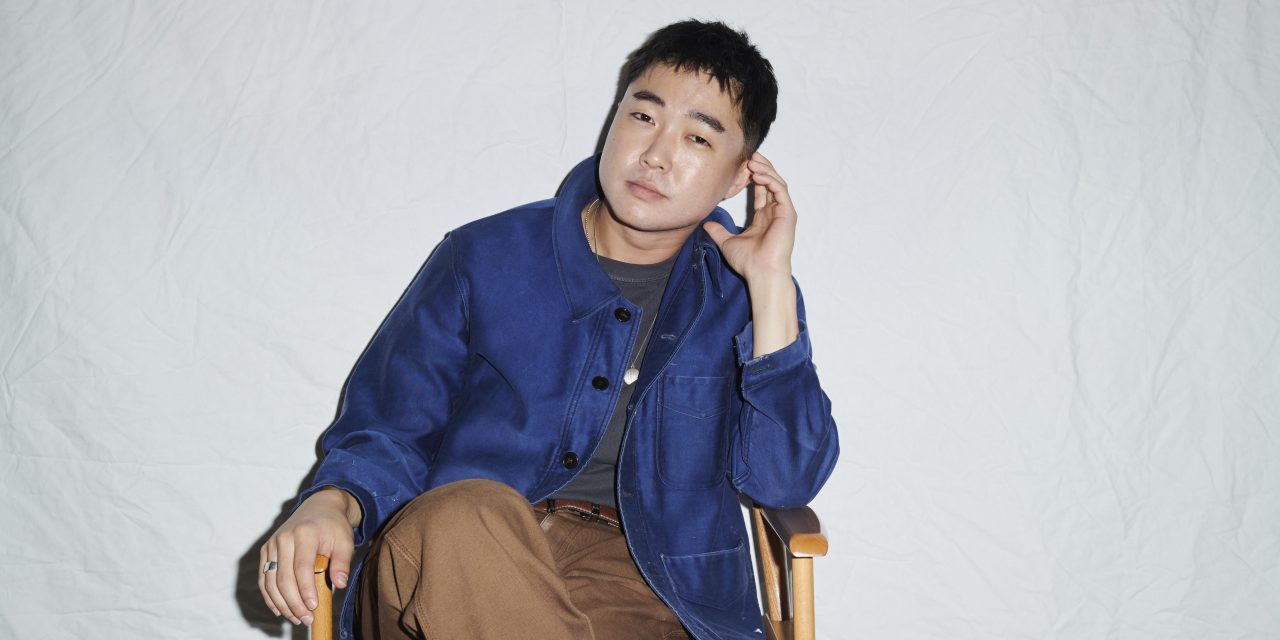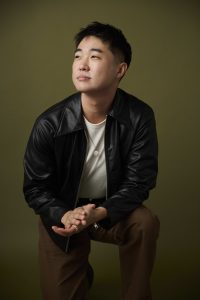
How to Succeed in Hollywood (While Really Trying)

William Yu ’09 is writing stories for TV and movies. How he came to be doing that is a story in itself.
Story by Steve Nadis
Photographs by Peter Yang
“It’s funny to say that a hashtag changed my life. But it’s true. A hashtag really did change my life,” says the Los Angeles-based screenwriter William Yu ’09.
Yu made some waves in the Twitter world in 2016 when he launched an awareness campaign using the hashtag #StarringJohnCho. “It was a time when a lot of fraught conversations were taking place about Asian representation [or the lack thereof] in the entertainment industry,” he says. The practice of “whitewashing” was still quite prevalent. For example, in the soon-to-be-released Ghost in the Shell, Scarlett Johansson was cast in the role of a Japanese character, Major Motoko Kusanagi. In the 2015 film Aloha, Emma Stone played a character supposedly of Hawaiian, Chinese, and Swedish descent, and in Dr. Strange (2016), Tilda Swinton portrayed a character who was originally supposed to be Tibetan. The director Aaron Sorkin reportedly claimed that there were no Asian stars in Hollywood. “That was a problem of perception,” Yu says. “It seemed that no one could picture it.”
But Yu, a Korean American who lived in Hong Kong from the age of five to twelve when his family moved to Massachusetts, could picture it quite clearly, and he wanted others to share his vision. To Yu, the Korean-born actor John Cho—who had already starred in both the Harold and Kumar and Star Trek series, along with many other films—was an entirely plausible leading man. In his initial Twitter thread, using the hashtag #StarringJohnCho—which was a side project Yu created (at a personal cost of $0) while holding a full-time job in advertising—he inserted Cho’s face into posters for Jurassic World and a range of other hit movies at that time. The campaign went viral: It was discussed in the New York Times, and on the BBC and CNN, among other media outlets. Yu became friends with John Cho as a result, and the director Jon M. Chu said that the hashtag inspired him to make the 2018 blockbuster Crazy Rich Asians.
 When his campaign debuted on Twitter, Yu was living in Manhattan, going through what he called his “quarter-life crisis.” He’d been working in the advertising business for about two years, since graduating from Tufts University in 2014. His Tufts advisor thought it might be a good field for him, affording a chance to cultivate both his creativity and his business savvy. Yet Yu was starting to feel some frustration. He really liked making things, but in many of the projects he was involved in, his efforts were focused on the earlier, strategic stages of the process, which left him a bit removed from the finished product. It occurred to him—at the ripe age of 25—that it might be time for a change. Some people with Hollywood connections had, in fact, reached out to him after the launch of #StarringJohnCho, saying things like “If you’ve written anything, I’d be happy to take a look.”
When his campaign debuted on Twitter, Yu was living in Manhattan, going through what he called his “quarter-life crisis.” He’d been working in the advertising business for about two years, since graduating from Tufts University in 2014. His Tufts advisor thought it might be a good field for him, affording a chance to cultivate both his creativity and his business savvy. Yet Yu was starting to feel some frustration. He really liked making things, but in many of the projects he was involved in, his efforts were focused on the earlier, strategic stages of the process, which left him a bit removed from the finished product. It occurred to him—at the ripe age of 25—that it might be time for a change. Some people with Hollywood connections had, in fact, reached out to him after the launch of #StarringJohnCho, saying things like “If you’ve written anything, I’d be happy to take a look.”
Back when he was a student at Milton, from 2005 to 2009, Yu had been, by his own admission, rather traditional. His favorite courses were English and history, and he engaged in the usual extracurricular activities: student government, sports, music (clarinet and saxophone), and writing for one of the school newspapers. He considered going into journalism but never thought screenwriting could be a real career. But after his brief brush with the entertainment world, thanks to his Twitter notoriety, and the encouragement he’d subsequently received from people in the business, he realized, “If I don’t jump in now, I will miss this window. If I want to have a role in increasing Asian representation in the media, I need to become part of the solution.”
He quit his job in 2017 and—because he didn’t have an office and was too broke to afford a WeWork membership—he resolved to sit in a café every day, reading every book on scriptwriting and every successful script he could get his hands on. The place he chose for this crash course was an establishment on the corner of Amsterdam and 68th called Boule & Cherie. He holed up there, taking advantage of the excellent WiFi reception while sustaining himself on coffee, sandwiches, and quiche.
After nearly a year, he completed his first feature-length script, Love You, Charlie—a tale of a high school valedictorian who sets out to prove the innocence of a friend accused of murder in a seemingly idyllic New England town that harbors more than its fair share of secrets. The script won the screenplay competition at the 2018 Asian American International Film Festival.
Yu moved to Los Angeles that year to be closer to the movie industry, and he’s been there ever since. He was running out of money after his “Upper West Side Coffee Shop Film School thing,” so he took on another advertising job. However, after being back in the ad game for six months, he quit again—this time for good—deciding that he either had to be “all in on the writing” or not in at all.
In his next project, he wrote a pilot for a TV series that he called Good Boy, which concerned a young Korean-American man who dreamed of breaking into the fashion business by launching his own streetwear brand while facing pressure from his family to go to medical school. The story is loosely autobiographical: Yu had taken a semester off from Tufts and worked part-time in a hip sneaker shop in Boston called Bodega. His script got him into the Sundance Episodic Makers Lab—a six-day program that enabled him to further develop his pilot with feedback from experienced TV showrunners, producers, and executives.
“This project ended up being my way into the industry,” Yu says “It got me my manager”—at Bellevue Productions, one of the top management companies in Hollywood—“and it got me my agents.” In fact, he has two agents, one to promote his TV writing ventures and another for feature films, both of whom are based at APA, one of the largest talent agencies in the entertainment industry. With their help, he shopped the script around; some production company executives found the story interesting, “but couldn’t quite see it.” So Yu ended up directing a short film based on the pilot, and he got Young Mazino—an actor who subsequently made a big splash in the Netflix series Beef—to star in it. The 16-minute film premiered in May on Omeleto, a YouTube channel (with 4 million subscribers) that promotes award-winning shorts.
With this film in hand, Yu and his agents are again trying to line up a company to produce the series. In March 2020, Yu started writing his second feature film, It Was You, about a young man who works in his grandfather’s shop in Chinatown, trying to save the neighborhood from a start-up company with expansionist plans. It Was You made the 2021 Black List—an annual list of favorite scripts selected by Hollywood executives. Jon M. Chu has signed on as producer, and his company is now shopping it to studios.
Yu next took on a historical drama centered on Koreagate—a political scandal from the 1970s concerning a Korean businessman charged with influence peddling in the United States. He finished the script for an hour-long pilot in 2022, and on the strength of that work, he was one of eight people out of 2,100 applicants admitted to the highly prestigious NBC TV Writers Program, which he completed in April 2023. And thanks to the contacts he made during the eight-month-long program, Yu was hired as a writer for a limited-series crime drama on the Peacock streaming service.
He’s got a few scripts circulating at the moment, with some encouraging signs that a deal, or deals, may soon be made. But meanwhile, Yu has an actual job, writing for a TV show (pending resolution of the Writers Guild of America strike). He’s literally in the business, pursuing a profession that he never contemplated as a teenager at Milton, and he’s glad to see that the business he’s now part of is starting to change in just the ways he hoped it would.
“When I launched #StarringJohnCho, seven years ago,” Yu says, “I never would have dreamed that a Korean-made movie, Parasite, would win numerous Academy Awards—including Best Picture, Best Director, and Best Original Screenplay—in 2020.” Nor did he imagine that Michelle Yeoh (from Malaysia) would win the Best Actress award and Ke Huy Quan (from Vietnam) would win the Best Supporting Actor award in 2023 for Everything Everywhere All at Once.
“That’s great to see, and it shows that things are moving in a positive direction,” Yu says. “But we are still in the early days of the representation conversation. To me, that’s exciting, because it means there are many more conversations to be had.” And he really hopes that some of the scripts he has worked on already, along with those yet to come, will become part of a conversation that he considers long overdue.
Steve Nadis is a freelance science writer based in Cambridge, Massachusetts. He’s a contributing editor for Discover and a contributing writer for Quanta. His articles have appeared in dozens of other magazines.




